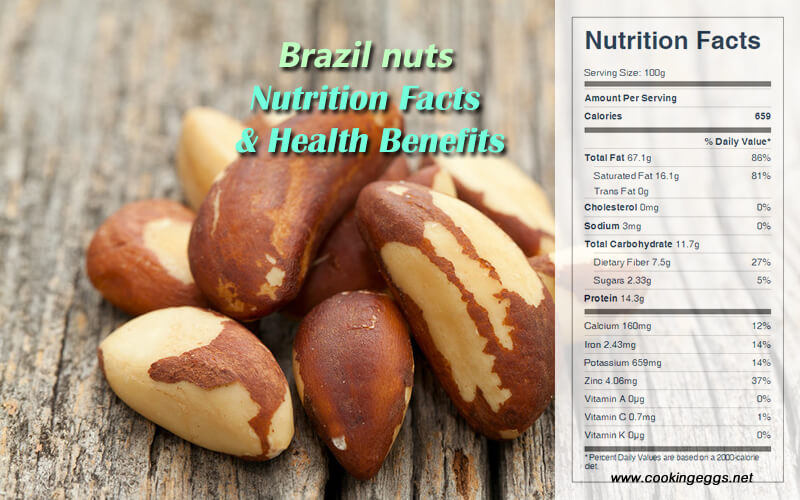Brazil nuts Nutrition Facts & Health Benefits
Brazil nuts are members of the Lecythidaceae. They are harvested in the wilds of the Amazon River Valley. The Brazil nut’s nutritious, oil-rich seeds are eaten fresh, roasted, or pressed to produce a milk-like extract.
Brazil nuts are notable for their diverse content of micronutrients, especially a high amount of selenium. Brazil nuts are perhaps the richest dietary source of selenium, with a 28 g serving of six nuts supplying 774% DV.

The nutritional value of Brazil nuts
Brazil nuts contain 14% protein, 12% carbohydrate, and 66% fat; 85% of their calories come from fat, and a 100-gram amount provides 659 kcal of food energy. The fat components are 23% saturated, 38% monounsaturated, and 32% polyunsaturated. Due to their high polyunsaturated fat content, primarily omega-6 fatty acids, shelled Brazil nuts may quickly become rancid.
Brazil nuts are a rich source of dietary fiber and various vitamins and dietary minerals. A 100 g amount (75% of one cup) of Brazil nuts contains a rich source of thiamin (54% DV), vitamin E (38% DV), magnesium (106% DV), phosphorus (104% DV), manganese (57% DV), and zinc (43% DV).
Brazil nuts Nutrition Facts Label
Health Benefits of Brazil nuts
Brazil nuts are a good source of the amino acids cysteine and methionine, making them beneficial in a vegetarian diet. They are a good source of selenium as well as rich enough in calcium to be beneficial for teeth and bones. The brown skin contains a significant portion of the polyphenols, making it important to consume the entire nut and skin.
Their caloric content chiefly comes from their fats. However, much of this fat content is composed of monounsaturated fatty acids that help lower LDL (bad cholesterol) and increase HDL (good cholesterol) levels in the blood. Research studies suggest that a diet that is rich in monounsaturated fatty acids has been found to protect against coronary artery disease and strokes by favoring a healthy blood lipid profile. The high selenium content is used as a biomarker in studies of selenium intake and deficiency. Consumption of just one Brazil nut per day over 8 weeks was sufficient to restore selenium blood levels and increase HDL cholesterol in obese women.
Selenium plays a significant role as an antioxidant through its selenoprotein. Selenium is a cofactor for glutathione peroxidase, a key antioxidant in the body. Adequate selenium in the diet can help prevent coronary artery disease, liver cirrhosis, and cancer.
Selenium also plays a key role in our thyroid pathophysiology. Specifically, selenium is important for the conversion of our thyroid hormones from the inactive form to the active form. In addition, several studies, including a recent meta-analysis, have demonstrated that selenium supplementation reduces thyroid antibodies after three, six, and twelve months of consistent consumption. This is seen specifically in selenium supplementation through Brazil nuts.
Selenium has also been found in research to support key neurotransmitters in the brain, such as gammaaminobutyric acid (GABA) and dopamine. These neurotransmitters play a pivotal role in conditions such as Alzheimer’s and Parkinson’s diseases. The selenium content in Brazil nuts can act as a preventive measure against these central nervous system diseases. In addition, low selenium levels have been linked to mood-related disorders, including anxiety and depression. One study found that symptoms associated with anxiety and depression decreased after five weeks of consuming one to two Brazil nuts a day!
In addition to the abundance of selenium found in Brazil nuts, when compared to other nuts, Brazil nuts and almonds present the highest concentration of polyphenols. The main polyphenols identified in Brazil nuts include gallic acid, ellagic acid, vanillic acid, and catechin. Brazil nuts are also high in anthocyanins, flavonols, and carotenoids. Phytosterols are also highly concentrated in Brazil nuts, considerably more than in other nuts.
Health Risk
The shells of Brazil nuts contain high levels of aflatoxins, which are produced by molds and can cause liver damage, including possible cancer, if consumed.
The nuts contain small amounts of radium, a radioactive element, about 1000 times higher than in several other common foods.
Brazil nuts also contain barium, a metal with a chemical behavior quite similar to radium, which can have toxic effects, such as weakness, vomiting, or diarrhea, after intentional or accidental ingestion.